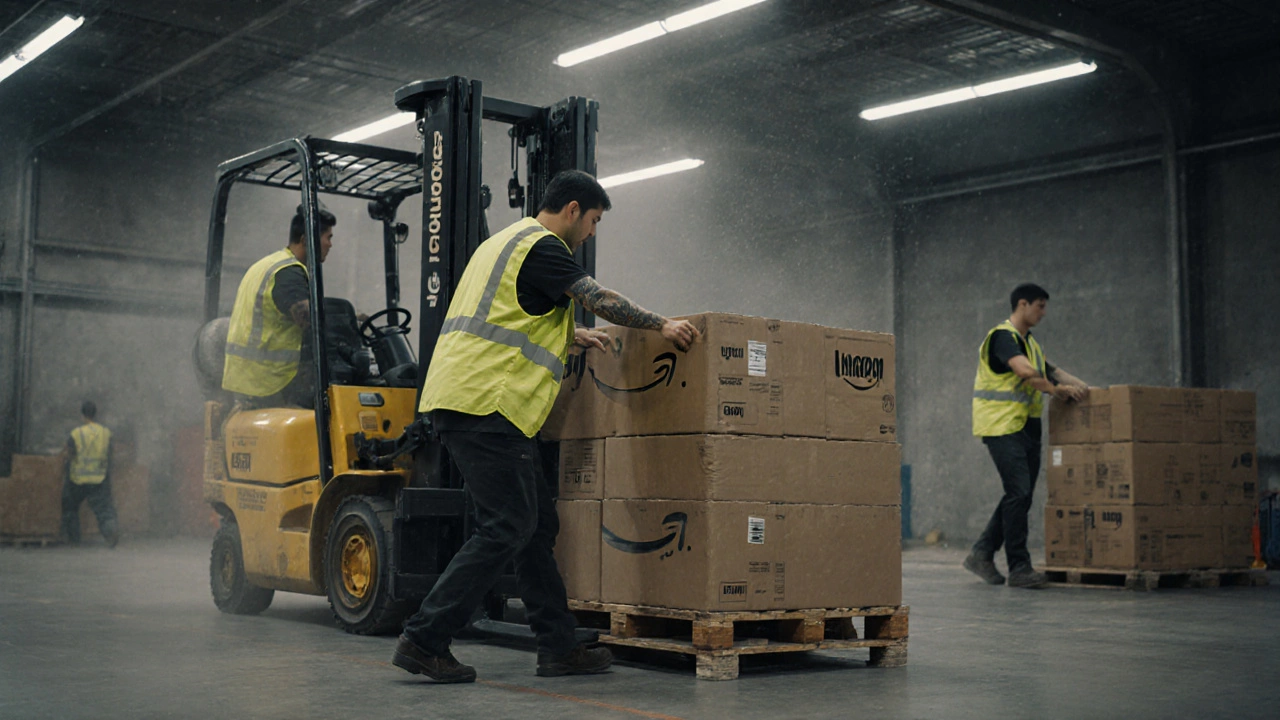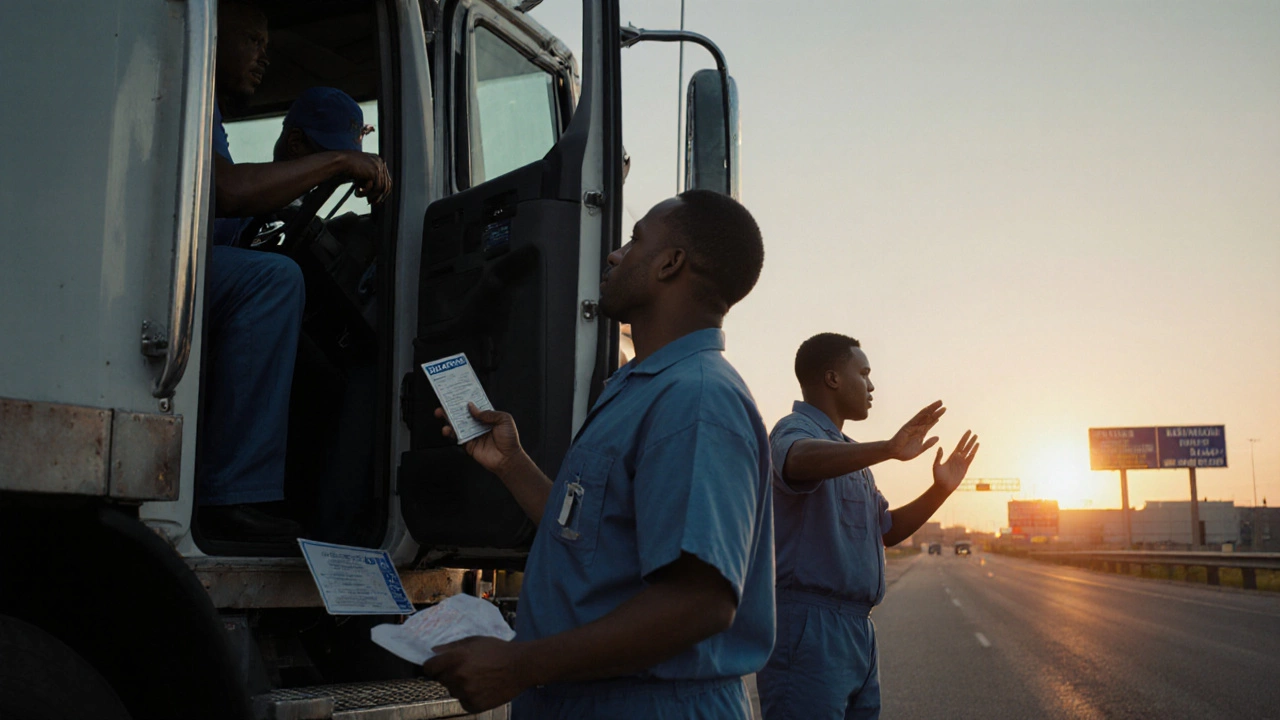Felony Job Eligibility Checker
Find Your Job Options
Answer these questions to see which job opportunities are accessible to you based on your criminal record.
Key Findings
Most employers won't consider your conviction if it's more than 5 years old and you've maintained a clean record.
Getting a job after a felony conviction isn’t impossible-but it’s not easy either. Many employers automatically screen out applicants with criminal records, even if the crime happened years ago or was nonviolent. But some jobs don’t care about your past. They care about your reliability, your work ethic, and whether you show up every day. And in those roles, a felony doesn’t block you-it just fades into the background.
Truck Driver (CDL Holder)
One of the most realistic paths out of unemployment for someone with a felony is becoming a truck driver. Commercial Driver’s License (CDL) programs are affordable, often funded by state reentry programs, and take as little as three to six weeks to complete. Companies like Swift Transportation, CR England, and even local delivery services hire ex-offenders regularly.
Why? Because the industry is desperate for drivers. Over 80% of U.S. freight moves by truck, and there’s a shortage of more than 80,000 drivers right now. Many trucking firms don’t run full background checks unless required by law. Even when they do, they often look at the nature of the offense. A drug possession charge from 2018? Usually fine. A violent crime? Maybe not. But for many nonviolent offenses, the door is open.
Pay starts at $50,000 to $70,000 a year. With experience, you can hit $80,000+. You don’t need a college degree. You don’t need perfect credit. You just need to pass a DOT physical, complete training, and stay clean.
Warehouse and Logistics Worker
Amazon, FedEx, UPS, and local distribution centers hire thousands of people with criminal records every year. These jobs don’t require customer interaction, and they’re often located in industrial zones outside city centers-places where employers are more focused on filling shifts than running deep background checks.
Most warehouse roles pay $15 to $20 an hour. Many offer overtime, and some even have tuition reimbursement programs. You don’t need experience. You don’t need a high school diploma in most cases. You just need to lift 50 pounds, follow safety rules, and be on time.
Amazon’s Second Chance program explicitly hires people with criminal records. They’ve hired over 15,000 individuals with convictions since 2018. The company doesn’t ask about convictions on the initial application. If you pass the basic screening, you’re in.
Construction Laborer
Construction crews hire based on sweat, not resumes. If you show up early, know how to use a shovel, and don’t cause trouble, you’ll get work. Union apprenticeships in plumbing, electrical, and carpentry often accept ex-offenders after a waiting period-usually two to five years after release.
Non-union contractors are even more flexible. A lot of small-time builders don’t run background checks at all. They care if you can handle a hammer, show up on time, and don’t steal tools. Many states have Reentry Workforce Programs that connect ex-offenders with construction training and job placements.
Entry-level laborers make $18 to $25 an hour. With certification, you can become a skilled tradesperson making $30+ an hour. And unlike office jobs, your past doesn’t matter when you’re hauling drywall or digging trenches.
Janitorial and Maintenance Staff
Hospitals, schools, government buildings, and office complexes need cleaners. And they need them every night. These jobs rarely require background checks beyond a basic criminal database scan. Even when they do, many employers overlook nonviolent offenses-especially if you’ve been clean for over a year.
Companies like Jani-King and ABM hire people with records. Pay is $12 to $16 an hour, and many positions offer benefits after 90 days. You can start without any formal training. You learn on the job. And because these roles are often outsourced, the hiring managers aren’t the same people who make HR policies.
This isn’t glamorous. But it’s stable. And it’s one of the few jobs where your criminal record won’t stop you from getting hired on the spot.

Food Service and Kitchen Staff
Restaurants, cafeterias, and food trucks hire people with records all the time. The turnover is high. The work is hard. And most owners don’t have the time or resources to run deep background checks.
Even in chain restaurants like McDonald’s, Subway, and Domino’s, hiring managers often skip criminal history checks unless the job involves handling money or working with kids. Dishwasher, prep cook, and line cook roles are the easiest to land.
Pay ranges from $12 to $17 an hour. Many places offer tips on top. And if you prove yourself, you can move up to shift supervisor or manager-positions that often don’t require a background check if you’ve been with the company for over a year.
Government Jobs That Don’t Screen You Out
Not all government jobs are off-limits. Some federal, state, and local agencies hire ex-offenders under specific programs. The Federal Bonding Program gives employers insurance to cover theft or fraud if they hire someone with a criminal record. That makes them more willing to take a chance.
Look for positions like:
- Park maintenance worker (state parks)
- Library assistant (public libraries)
- Mailroom clerk (city or county offices)
- Waste collection worker (sanitation departments)
- Correctional officer trainee (in some states, if you’re not the type of person who committed the crime)
These roles often have less stringent screening because they’re not security-sensitive. You still need to apply through official portals, but many listings don’t even mention background checks upfront. Call the HR department directly. Ask: “Do you run criminal background checks for this role?” Most will tell you honestly.
What Jobs to Avoid
Some doors stay locked. Don’t waste time applying for:
- Jobs involving children (teachers, daycare workers, youth counselors)
- Positions handling money or financial data (bank tellers, accountants, auditors)
- Law enforcement or security roles (police, private investigator, armed guard)
- Government jobs requiring security clearances (FBI, CIA, defense contractors)
- Healthcare roles requiring licensure (nurses, pharmacists, EMTs)
These jobs have legal restrictions. Even if you’re qualified, you’ll get rejected automatically. Save your energy for fields where your record doesn’t disqualify you by law.

How to Improve Your Chances
Even in jobs that don’t require background checks, your application still needs to stand out. Here’s how:
- Use a clean resume. Don’t list your conviction unless asked. Focus on skills: “Managed inventory,” “Operated forklift,” “Maintained equipment.”
- Get a certification. A CDL, OSHA 10, or food handler’s card shows you’re serious.
- Apply in person. Walk into a warehouse or restaurant and hand your resume to the manager. Face-to-face makes a bigger impression than an online form.
- Use reentry programs. Organizations like Center for Employment Opportunities and Goodwill help people with records find jobs. They train you, prep you for interviews, and sometimes even guarantee placement.
- Wait it out. Many employers won’t hire you if your conviction is less than three years old. After five years, most won’t even look.
Real Stories, Real Results
James, 34, served six years for a nonviolent drug offense. After release, he worked at a car wash for $10 an hour. He saved $2,000, enrolled in a CDL program through a state reentry grant, and now drives a semi for a national carrier. He makes $68,000 a year. He’s been clean for seven years. No one asks about his past anymore.
Linda, 42, was convicted of fraud in 2017. She couldn’t get an office job. She started cleaning offices at night. Within two years, she was managing a team of six. Now she runs her own janitorial business with five employees. She doesn’t need a background check to hire people-she just needs them to show up.
These aren’t rare cases. They’re common.
Bottom Line
The best job for a felon isn’t the one with the highest pay. It’s the one that lets you walk in the door without being judged before you speak. Trucking, warehouse work, construction, cleaning, and food service are all real paths. They don’t require a degree. They don’t require a spotless record. They just require you to show up, work hard, and stay consistent.
After five years of clean living, your record becomes irrelevant. Until then, focus on the jobs that don’t ask questions. Build your reputation with your hands, not your history.
Can I get a government job with a felony record?
Yes, but only for certain roles. Jobs like park maintenance, sanitation worker, or mailroom clerk often don’t require background checks beyond basic screenings. Avoid positions involving security, finance, or working with children. Apply directly to local government offices and ask HR if background checks are required for the specific role.
Do Amazon and FedEx hire felons?
Yes. Both Amazon and FedEx hire people with criminal records, especially for warehouse and delivery roles. Amazon’s Second Chance program actively recruits ex-offenders. They don’t ask about convictions on the initial application. FedEx hires for similar positions and often overlooks nonviolent offenses after five years.
How long do I have to wait before employers stop caring about my record?
Most employers won’t hire you if your conviction is less than three years old. After five years, many will no longer check your record-especially if you’ve stayed clean, have steady work, or have certifications. Some states legally restrict background checks to the last seven years. After that, your record is effectively invisible to most employers.
What certifications help felons get hired?
CDL (Commercial Driver’s License), OSHA 10 (safety certification), food handler’s permit, and forklift operator certification are the most valuable. These are affordable, often free through reentry programs, and prove you’re serious about working. They also open doors to higher-paying jobs in trucking, logistics, and construction.
Can I get a job if I’m still on probation?
Yes, but it depends on your probation terms. Some probation officers require you to be employed, so they’ll help you find a job. Avoid positions that conflict with your probation conditions-like working near schools if you’re restricted from being around children. Most manual labor jobs don’t interfere with probation. Just be upfront with your employer if asked.
